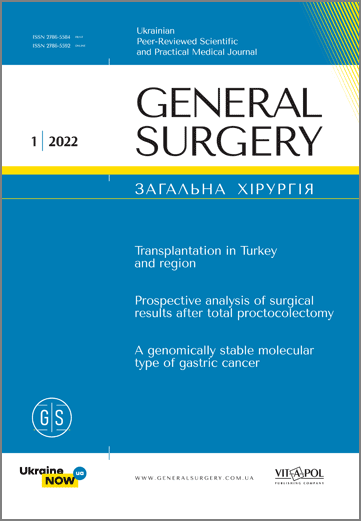Nutritional support for patients in general surgery
DOI:
https://doi.org/10.30978/GS-2022-1-48Keywords:
enhanced recovery after surgery, nutritional supportAbstract
The modern stage of development of surgery, especially minimal invasive technologies, has significantly changed the surgeons' thoughts about the perioperative period. Until the end of the twentieth century, pre‑ and postoperative fasting was the most important requirement in planned surgery. It was believed that it could help to avoid complications both during surgery and in the early postoperative period. H. Kehlet in his fundamental work outlined the factors that allowed to accelerate the patient's recovery after surgery, namely: the absence of preoperative fasting.
Objective — to evaluate the effectiveness of nutritional support for surgical patients within ERAS (Enhanced Recovery After Surgery) and ESPEN (European Society for Clinical Nutrition and Metabolism) protocols.
Materials and methods. This research included both traditional laparoscopic cholecystectomy (177 cases) and single‑port transumbilical cholecystectomy (8); among laparoscopic bariatric interventions, the major part was represented by classical Roux‑Y gastric shunting (28), as well as sleeve gastrectomy (5) and mini‑gastric shunting (4); among 123 different laparoscopic hernioplasties, in 64 cases transabdominal preperitoneal (TAPP) was performed for bubonocele, intraperitoneal onlay mesh (IPOM) for postoperative ventral and umbilical hernias (59), laparoscopic crurography and fundoplication with and without alloplasty (33). For each type of surgery two groups we identified: control and experimental. Both groups were followed by ERAS protocols in addition to nutritional support. With the prior consent of patients before surgery: the experimental group received full perioperative nutritional support according to our local protocols using protein‑enriched sip feeding formula Nutridrink Protein, the control group followed the traditional scheme of fasting during 12 hours before surgery and received regular drinking water instead of protein mixtures at the first postoperative day.
Results. We found statistically significant difference between control and experimental groups in assessing of two important parameters as hunger and weakness. The hunger after laparoscopic cholecystectomy was 1.5 times (p < 0.001), after laparoscopic hernia repair — 1.7 times (p < 0.001), after laparoscopic crurography and fundoplication — 1.26 times (p < 0.001), after laparoscopic bariatric intervention — 1.43 times, and after laparoscopic colon intervention — 1.9 times lower in the experimental group. The weakness after laparoscopic cholecystectomy was 1.8 times (p < 0.001), after laparoscopic hernia repair — 1.31 times (p < 0.001), after laparoscopic crurography and fundoplication — 1.68 times (p < 0.001), after laparoscopic bariatric intervention — 1.67 times (p < 0.001), and after laparoscopic colon intervention — 1.38 times (p = 0.006) stronger in the control group.
Conclusions. Traditional long‑term preoperative fasting is inappropriate. Combined with other ERAS postulates, perioperative nutritional support for surgical patients has a great chance of success. In our research, early restoration of oral nutrition significantly decreases hunger and general weakness in the early postoperative period, which allows the patient quickly return to full life.
References
Edwards G, Morton H, Pask E, Wylie W. Deaths associated with anaesthesia. Anaesthesia. 1956;11(3):194-220.
Kehlet H, Wilmore D. Multimodal strategies to improve surgical outcome. The American Journal of Surgery. 2002;183(6):630-41.
Kehlet H, Wilmore DW. Fast-track surgery. British Journal of Surgery. 2005;92(1):3-4.
History [Internet]. ERAS® Society. 2022 [cited 2022 Jan 24]. Available from: https://erassociety.org/about/history/
Gillis C, Carli F. Promoting perioperative metabolic and nutritional care. Anesthesiology. 2015;123(6):1455-72.
Weimann A, Braga M, Harsanyi L, et al. Espen guidelines on enteral nutrition: Surgery including organ transplantation. Clinical Nutrition. 2006;25(2):224-44.
Lassen K. Consensus review of optimal perioperative care in colorectal surgery. Archives of Surgery. 2009;144(10):961.
Lidder P, Thomas S, Fleming S, Hosie K, Shaw S, Lewis S. A randomized placebo controlled trial of preoperative carbohydrate drinks and early postoperative nutritional supplement drinks in colorectal surgery. Colorectal Disease. 2013;15(6):737-45.
Soeters M, Soeters P, Schooneman M, Houten S, Romijn J. Adaptive reciprocity of lipid and glucose metabolism in human short-term starvation. American Journal of Physiology-Endocrinology and Metabolism. 2012;303(12):E1397-E1407.
Melnyk M, Casey R, Black P, Koupparis A. Enhanced recovery after surgery (ERAS) protocols: Time to change practice? Canadian Urological Association Journal. 2011:342-8.
Ioffe OY, Stetsenko OP, Tarasiuk TV, Kryvopustov MS. Perioperative Nutrition as an important aspect implementing fast track surgery principles. One Health and Nutrition Problems of Ukraine. 2019;(2):21-7.
Braga M, Ljungqvist O, Soeters P, Fearon K, Weimann A, Bozzetti F. Espen guidelines on Parenteral Nutrition: Surgery. Clinical Nutrition. 2009;28(4):378-86.
Lobo DN, Hendry PO, Rodrigues G, et al. Gastric emptying of three liquid oral preoperative metabolic preconditioning regimens measured by Magnetic Resonance Imaging in healthy adult volunteers: A randomised double-blind, crossover study. Clinical Nutrition. 2009;28(6):636-41.
Greco M, Capretti G, Beretta L, Gemma M, Pecorelli N, Braga M. Enhanced recovery program in colorectal surgery: A meta-analysis of randomized controlled trials. World Journal of Surgery. 2013;38(6):1531-41.
Feo CV, Romanini B, Sortini D, et al. Early oral feeding after colorectal resection: A randomized controlled study. ANZ Journal of Surgery. 2004;74(5):298-301.
Lassen K, Kjæve J, Fetveit T, et al. Allowing normal food at will after major upper gastrointestinal surgery does not increase morbidity. Annals of Surgery. 2008;247(5):721-9.






